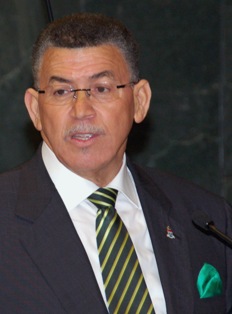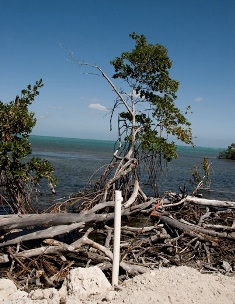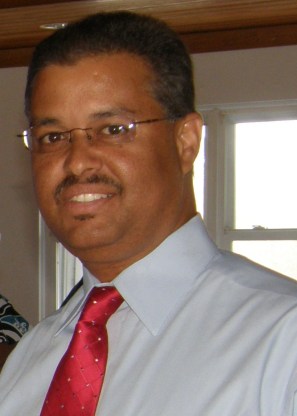Archive for February, 2011

Bush targets zero public debt
 (CNS): Following his trip to Jersey earlier this month the Cayman Islands premier has said that he would like to see this jurisdiction copy the UK crown dependency when it comes to managing public finances especially its lack of public debt. He said Jersey has zero public debt as the jurisdiction has not borrowed any money since the 1950s, has reserves of over 1.6billion pounds and has funded all of its capital projects through its own revenue. McKeeva Bush told the legislative Assembly on Wednesday that it was a position and philosophy that he would like the Cayman government to achieve.
(CNS): Following his trip to Jersey earlier this month the Cayman Islands premier has said that he would like to see this jurisdiction copy the UK crown dependency when it comes to managing public finances especially its lack of public debt. He said Jersey has zero public debt as the jurisdiction has not borrowed any money since the 1950s, has reserves of over 1.6billion pounds and has funded all of its capital projects through its own revenue. McKeeva Bush told the legislative Assembly on Wednesday that it was a position and philosophy that he would like the Cayman government to achieve.
He said Cayman’s debt had been forced on his government and it was now in a position where it was unable to borrow anymore. Despite improvements in the country’s economic situation he pointed out that the public debt as of January 2011 was CI$560million and the FCO had stated that the government would not be able to borrow anymore money next year. He also lamented the fact that no money had been put into the country’s reserves since 2004.
“My government happens to be fundamentally averse to borrowing” he stated. “We have had to incur borrowing during our present term to continue capital projects started by the previous government.”
Bush said when he came to office in May 2009 following the PPM administration there was a public debt of CI$373 million approximately three times what it was when he left office in May 2005 or 163% increase in the debt position by the PPM over its four-year term of government.
He stated that now if government were to borrow the full $155million which the UK had approved for the 2010/11 financial year the country would then owe more than CI$626million. With a projected GDP for this year of around CI$2.5 Billion central government debt would be 25.3 percent of the GDP, which Bush said was too far and he did not intend to take it any further.
Bush also hit back at reports in the British press that the UK government had lent money to Cayman which was not true. He noted that Cayman had never received a red cent from the UK not even in the wake of Ivan. However, Cayman had sent money to the UK during the 1980s when it was fighting the Falklands war.
Although not from the UK, the cost of servicing the government’s debt obligations is forecasted to be around 13% of government’s revenue for this year which is in excess of the maximum specified in the Public Management and Finance Law of 10%.
As a result Bush said that in future infrastructure development by government could only occur from its own resources.
“Since the introduction of more revenue enhancement measures by the Government is not an optimal choice, the country must move on other alternatives to obtaining the resources needed to develop and enhance the Islands’ infrastructure: that is, by using public assets and using the proceeds there from to continue the development of these Islands,” the premier said.
He revealed his intention to use private projects and the country’s assets to develop the infrastructure that the country needed.
“The possibility of central government borrowing externally in the short-term to provide funding needed to develop the Islands’ infrastructure is not going to happen. Therefore, the careful use of our public assets, the utilization of our national assets, the construction of the North Sound Channel, the development of a Special Economic Zone, the Shetty Hospital and other infrastructure-boosting projects represent a sensible way of continuing the much-needed development of these Islands,” he stated, adding that the projects would be of benefit not just in the present situation, but to future generations.
See premier’s official statement below

CIMA receives final report on insurance firm’s demise
(CNS): The Cayman Islands Monetary Authority has now closed the Cayman chapter in the story of the on the collapse of British American Insurance Company Limited.(BAICO). CIMA said Tuesday that it had now received the final report from the controllers Simon Whicker and Kris Beighton from KPMG appointed to manage the affairs of the Cayman Branch which confirms that it has ceased to carry on business and no longer carries any insurance liabilities. CIMA said the insurance company has also been removed from the Companies Register.
The authority said that in view of the completion of the work CIMA has now revoked the appointment of Whicker and Beighton in accordance with section 13(4)(a) of the Insurance Law (2008 Revision). In addition, the Class A insurer’s licence granted to BAICO has been cancelled pursuant to section 14 of the Law.
BIACO a Bahamian company operated out of Trinidad, with branches throughout the Caribbean collapsed in 2009 and had wide reaching socio-economic effects across the eastern Caribbean region.

President invites all to university conference
(CNS): The University College of the Cayman Islands (UCCI) is hosting its 2nd Annual Caribbean Conference next month on Leadership, Governance and Empowerment, which the university president said was the perfect backdrop todiscuss today’s issues on education, economic development, and nation-building. With many issues facing the community Roy Bodden said there was no better time to discuss collectively, how Cayman developed as a nation in these areas, to let us know that we can succeed in the future. Everyone is welcome to attend the conference which will host an interesting line up of local and regional speakers.
“When we speak of Leadership, Governance and Empowerment in the Caribbean, we cover every aspect from the simplest to the most sophisticated,” UCCI President Roy Bodden and author of Patronage, Personalities and Parties, Caymanian Politics from 1950-2000 said.
He explained how individually, residents contribute daily to the principles of leadership, governance and empowerment whenever one volunteers for community projects, manages their personal affairs or supports charities.
“The upcoming conference .. is open to every person residing in the Cayman Islands. It presents a wonderful opportunity for persons across the society to become involved because these issues are relevant to every person in the community. That’s why we encourage community-wide involvement,” Bodden added.
History shows how Cayman’s merchant class demonstrated leadership as they sought to move the country from its 1863 designation as a dependent territory to greater self government. On July 4, 1959, Cayman adopted its first constitution, with the assistance of Jamaica, its colonial administrator. In terms of governance, the right to vote and run for political office was won by women and Caymanian residents of colour and Jamaican descent during the 1950s and 60s, as political parties emerged out of a system that initially excluded them as equal citizens.
Caymanians continue to empower themselves, as they participate in ongoing debates on issues that confront them today. Also of particular note is the dynamic evolution of Cayman’s communities, which have become a great cultural mix. Although no one knew at the time how these developments would impact the nation, each era has contributed to Cayman achieving one of the top per capita incomes in the Caribbean.
Just as before, Cayman must continue to address issues, especially so that our young people with have the brightest future possible, and the upcoming UCCI International Conference provides that opportunity to further a community wide conversation, the president added.
James ‘Jamo’ Myles, member of the Planning Committee said the Youth Services Unit was committed to empower the nation, one youth at a time. “That’s why we implore all young people and their families to attend the UCCI conference which aims to energize and invigorate the spirit of leadership. So make your best effort to be there, it could change your life,” he said.

Ministry accounts get failing grades
 (CNS): A significant number of annual reports were laid on the table of the Legislative Assembly on Monday but most of them will be of little use to the wider public. Three of the fifteen reports came from the Ministry of District Administration, Planning, Agriculture and Housing covering the financial year ends from 2006 – 2008, all of which carried disclaimers from the auditor general. The money spent by ministry officials during that time cannot be verified and the public cannot be sure how their cash was spent. The auditor general states in his disclaimer that he was unable to verify completeness, accuracy or the valuation of the accounts receivable for a lack of documentation in all three reports.
(CNS): A significant number of annual reports were laid on the table of the Legislative Assembly on Monday but most of them will be of little use to the wider public. Three of the fifteen reports came from the Ministry of District Administration, Planning, Agriculture and Housing covering the financial year ends from 2006 – 2008, all of which carried disclaimers from the auditor general. The money spent by ministry officials during that time cannot be verified and the public cannot be sure how their cash was spent. The auditor general states in his disclaimer that he was unable to verify completeness, accuracy or the valuation of the accounts receivable for a lack of documentation in all three reports.
He also goes on to point out in over three pages of disclaimer that inadequate record keeping and stock taking means there is no way to verify the ministry’s inventory. When it came to plant and equipment, the auditor general revealed that officials were not even sure if some of the buildings the ministry used and maintained belonged to government.
“Management could not verify the ownership of buildings recorded in the fixed asset register,” Alastair Swarbrick, the auditor general, reveals in the disclaimer. “There was uncertainty regarding ownership of other buildings that were not recorded on the fixed assets register but were being maintained and otherwise utilized by the ministry.”
In the last report for 2007/08, the auditor says he was unable to verify accounts payable of over $4 million of public money. He said that $323,000 presented as employee entitlements was not substantiated and documents didn’t support the figure of $18.2 million for personnel costs. The disclaimer also said the ministry’s claim of a net worth balance of $21.4 million had no supporting evidence.
Everything from consumables to cash flow statements were unsupported and the auditor repeats over and over that he cannot verify their accuracy.
The reports are now public documents and hard copies are available from the Legislative Assembly. The FOI disclosure log on the website for the Ministry of DAPAH www.dapah.gov.ky has not been updated since 18 September 2008 (as of 11:00am today) and so far no documentation has been logged.
Of the remaining reports, two came from the Turtle Farm for the years ending 2007 and 2008 and six from the National Roads Authority, bringing that government entity up to date. The Water Authority submitted a report for the year ending 2009, as did the Airports Authority. Both the ERA and CINICO submitted their 2010 reports.

Mangroves remain vulnerable
 (CNS): With no sign of the National Conservation Law, the country’s dwindling mangroves remain extremely vulnerable as more of the critical natural resource will be removed in the near future to accommodate the West Bay Road by-pass extension. Dart Realty cleared a strip of the crucial plant recently in order to do geo-technical work in the area where a new road is likely to go following its purchase of the land around the yacht club. However, far more will be destroyed when the full road project gets underway in the near future as, despite their critical importance, mangroves have no legal protection. These latest mangrove casualties join over 300,000 sq ft of mangrove removed by Orion Developers at the Ritz resort last year. (Photo Dennie Warren Jr)
(CNS): With no sign of the National Conservation Law, the country’s dwindling mangroves remain extremely vulnerable as more of the critical natural resource will be removed in the near future to accommodate the West Bay Road by-pass extension. Dart Realty cleared a strip of the crucial plant recently in order to do geo-technical work in the area where a new road is likely to go following its purchase of the land around the yacht club. However, far more will be destroyed when the full road project gets underway in the near future as, despite their critical importance, mangroves have no legal protection. These latest mangrove casualties join over 300,000 sq ft of mangrove removed by Orion Developers at the Ritz resort last year. (Photo Dennie Warren Jr)
“Mangroves are a critically important part of the island ecosystem which have special attributes that cause them to be particularly valuable from an environmental perspective,” the director of government’s environment department, Gina Ebanks-Petrie told CNS. “Without the National Conservation Law, mangroves, despite that importance, have no protection at all. Even mangrove which forms part ofa buffer zone isn’t protected, as was demonstrated when the planning authority gave the Orion permission to remove over 370,000 square feet last year despite the DoE’s advice against it.”
The Ritz developer had promised that the mangrove he had removed last summer on the site where the new resort, Dragon Bay, is planned would be replenished. However, since Orion Developers made a significant number of staff connected to the Dragon Bay development redundant, including Ken Crews, one of the project leaders working on the mangrove project, concerns have been raised that the mangroves won’t be replaced at all.
CNS recently asked Orion what was happening with the project and we were told that it was ongoing with the first phase of transplanting and raising 4,000 mangrove plants complete. “The healthy plants are now ready to be placed within the buffer zone, and this phase of the replenishment project will soon begin under the guidance of expert environmentalists. We remain committed to the ongoing rehabilitation of the mangrove area, and look forward to the growth of healthy and pollutant free plants,” a spokesperson for the firm stated.
However, there have been no significant changes since CNS last visited the site soon after the mangrove buffer was removed last summer and if rehabilitation had been the main motivation the developer had other options, Ebanks-Petrie noted. She said that there was no need for the mangroves at the Dragon Bay site to have been removed as they were not, as the developer suggested, dead across the entire area. She noted that the small areas where the mangroves had been impacted by Hurricane Ivan prior to their removal were already showing strong signs of recovery and could have been helped along using other techniques.
The goal to replenish the zone is a difficult one as mangroves are notoriously difficult to replace once they have been removed and take a long time to reach the dense levels of those that were removed by Orion.
In the most recent case, the Dart group, which has on many occasions loudly proclaimed its environmental credentials, did not require planning permission to destroy the mangroves for testing purposes. Ebanks-Petrie said that the rest of the mangroves, which are likely to be targeted for clearance once the road direction is confirmed, do not form part of a buffer. So with no laws at their disposal, the director and her team will not be able to protect them. She did say that the developer didn’t need to remove so much of the habitat for testing purposes as she said there are ways to test the peat, levels and quality of the earth without completely clearing all of the plants. If the road now takes a different route then those mangroves would have been saved. However, the director pointed out that with plans moving ahead to extend the by-pass, which is already gazetted, the mangroves in the entire area are a lost cause.
The only thing that may be able to preserve what is left of the country’s mangrove is the long awaited National Conservation Law. Following the umpteenth consultation period of the law, which ended late summer, the director confirmed that the latest draft of the NCL is still waiting to go before the government for a decision and she had no more news on when the public could expect the Cabinet to discuss it.

Bestselling author to finish latest book in Cayman
 (CNS): New York Times bestselling author Robert Goolrick will be finishing his latest novel in the Cayman Islands with the first writer’s residency hosted by the Department of Tourism and local book store Books & Books. The residency is designed to give writers a block of time for concentrated work and Goolrick will be visiting for two weeks. Books & Books said that hosting a writer’s residency for an author of Goolrick’s calibre will put Cayman on the literary world map and create future opportunities to bring other authors to the Island. Goolrick’s award-winning debut novel, A Reliable Wife, enjoyed an impressive run on the New York Times bestsellers list and was also a Books & Books 2010 bestseller.
(CNS): New York Times bestselling author Robert Goolrick will be finishing his latest novel in the Cayman Islands with the first writer’s residency hosted by the Department of Tourism and local book store Books & Books. The residency is designed to give writers a block of time for concentrated work and Goolrick will be visiting for two weeks. Books & Books said that hosting a writer’s residency for an author of Goolrick’s calibre will put Cayman on the literary world map and create future opportunities to bring other authors to the Island. Goolrick’s award-winning debut novel, A Reliable Wife, enjoyed an impressive run on the New York Times bestsellers list and was also a Books & Books 2010 bestseller.
Booklovers will have a chance to meet Goolrick when he visits Books & Books on Friday, 4 March, for a discussion and signing of A Reliable Wife. Robert Goolrick is also the author of the critically acclaimed memoir, The End of the World as we Know it.

Cops snub local pilot
 (CNS): The pilot and owner of Cayman Islands Helicopters says his firm tried everything it could to accommodate the RCIPS’ needs over the maintenance of its helicopter but the police, not CIH, terminated negotiations. Jerome Begot flew around 528 hours for the RCIPS between 2004 and 2008, charged at cost and as a priority over the profit making arm of his business but the police have snubbed him over the contract. He also hired a specialist engineer at the RCIPS management’s request and was led to believe his firm would be maintaining the machine when it came to Cayman. However, despite revising his proposals several times and making it as inexpensive as possible the police cut off negotiations in October and opted to use a US based firm instead until it can recruit its own engineer.
(CNS): The pilot and owner of Cayman Islands Helicopters says his firm tried everything it could to accommodate the RCIPS’ needs over the maintenance of its helicopter but the police, not CIH, terminated negotiations. Jerome Begot flew around 528 hours for the RCIPS between 2004 and 2008, charged at cost and as a priority over the profit making arm of his business but the police have snubbed him over the contract. He also hired a specialist engineer at the RCIPS management’s request and was led to believe his firm would be maintaining the machine when it came to Cayman. However, despite revising his proposals several times and making it as inexpensive as possible the police cut off negotiations in October and opted to use a US based firm instead until it can recruit its own engineer.
A spokesperson for the RCIPS recently told CNS that the cost proposed by CIH was excessive and not value for money, leading to the decision to keep the contract with Arrow Aviation LLC, a Louisiana based company that did the original work after the helicopter was purchased until an engineer was recruited. However, Begot, who has been involved in the operation and maintenance of helicopters for over 16 years, disputed the RCIPS position and voiced concerns that there is no need for the helicopter to leave the island for maintenance as his firm was not offering an unreasonable deal.
Over the years that Begot flew for the RCIPS he made a number of personal sacrifices to make himself available to the police whenever they needed him, effectively being on standby for four years. He willingly took on the engineer recommended by the RCIPS in 2007, despite the fact that it took almost three years before the helicopter arrived in Cayman. The police also fell into arrears with CIH over the four years Begot flew for them, with the firm subsidising the police at times for amounts in excess of $150,000, despite the fact that he received no profit or interest.
As the only bidder in response to the request for proposals when the helicopter finally arrived, Bergot said his firms entered into negotiations with the RCIPS. The initial request from the RCIPS via the tender was to provide all maintenance services to the aircraft, to be responsible for all base and line maintenance requirements, deal with administrative matters and to ensure that the maintenance schedules met the requirements of the aircraft’s manufacturer and Cayman Islands law. It would have also required CIH to represent the RCIPS in relation to any service to be provide in connection with the engines of the aircraft and the engine manufacturers and to prepare various scopes of work that would normally be provided by the aircraft maintenance provider.
“On top of this we were also required to maintain and update all of the administrative aspects of operating the aircraft, including matters such as maintenance schedules, quality planning, air worthiness directives, and to carry out such additional maintenance services as recommended,” Begot revealed. “This scope of works, which is essentially a full maintenance contract, is an expensive contract. Aircraft, particularly helicopters, are expensive to maintain. That is a simple fact of life.”
CIH priced the scope of works for two scenarios, firstly for a contract for a two-year period and a contract for a one-year period. “Our initial bid for the one-year contract was CI$510,000.00 and CI$819,500.00 for a two-year contract,” Begot told CNS. “These quotes, whilst obviously expensive, are in fact very reasonable.”
In comparison, he explained, the MRCU fixed wing aircraft budgets around CI$500,000 for its scheduled maintenance, which is provided by their own employees.
“In my meetings with the RCIPS I was led to believe that these quotes were certainly within their budget, although the RCIPS was keen to see them reduced if that was possible,” he explained. “In March 2010 we were requested to provide a quote for a much reduced and revised scope of works. In light of the reduced scope we put forward bids of CI$315,625.00 and CI$441,375.00 for one and two year contracts respectively.”
Having been led to believe that the initial bid was within the police budget, the revised must have also been within the money set aside for maintaining the machine. However, Begot said he was asked to re-price a further revised and reduced scope of work and the final proposal provided to the police last September was for CI$195,000 per annum.
“We were led to believe by the head of their air wing, Mr Fitzgerald, that the pricing was acceptable as were our attorney’s comments on the agreement. Mr Fitzgerald advised me that he would push to allow CIH to start as soon as possible,” Begot stated.
It was then, Bergot revealed, that he received correspondence from Fitzgerald that a member of the RCIPS Gold Command had taken objection to the negotiations as they had not included the possibility of the RCIP having their own aircraft maintenance department.
“Obviously, if the RCIPS wish to havetheir own self contained air wing, we would have no part to play in that and therefore there would be absolutely no need to have any negotiations with a third party service provider if the RCIPS’ real wish was to employ its own aircraft engineers and maintenance personnel,” the helicopter pilot said. Nevertheless, a short time later the firm was advised that the matters were in fact moving ahead towards a contract with CIH based on its last offer. Then, in October Bergot received an email from Fitzgerald saying the police would not be contracting CIH and the firm has not heard from the RCIPS, the portfolio or government since.
“In light of the history of our dealings with the RCIPS and the premier’s recent statement that government would attempt to assist the local economy by dealing primarily with local providers wherever possible, we are surprised by this turn of events,” Begot said. “It was not a case of us not being able to come to terms with them. We facilitated their needs until the end. Throughout the negotiations, which lasted almost a year, we understood all our quotes to have been ‘within budget’. The RCIPS simply terminated negotiations with us.”
Begot states that while he has his own reasons to be disappointed, the cost of bringing in maintenance engineers from the US on a regular basis to maintain the helicopter and of sending the helicopter overseas is far more than the quotes he gave and is, furthermore, an unnecessary loss of the machine to the police crime fighting arsenal.
See latest RCIPS comment regarding the helicopter maintenance below

Volunteer runs free computer classes at library
 (CNS): The George Town public library is offering free computer classes to people wanting to get to grips with basic information technology and acquire a new skill. Offered in partnership with Micro Matrix’s Sandra Catron, the 12-week course will begin at 10:15am on 5 March with the first two hour Saturday class. Spaces are limited however, as only 10 places are available for this first class. Interested persons are therefore encouraged to register as soon as possible, using forms available from reception at the George Town Public Library, according to a release from GIS.
(CNS): The George Town public library is offering free computer classes to people wanting to get to grips with basic information technology and acquire a new skill. Offered in partnership with Micro Matrix’s Sandra Catron, the 12-week course will begin at 10:15am on 5 March with the first two hour Saturday class. Spaces are limited however, as only 10 places are available for this first class. Interested persons are therefore encouraged to register as soon as possible, using forms available from reception at the George Town Public Library, according to a release from GIS.
Titled Computer Basics Foundation, the course covers a wide range of areas including general information technology concepts, the Internet, Outlook and Microsoft Office. “It’s ideal for beginners and aims to equip participants with essential skills for lifelong learning and personal development,” Community Librarian Deborah Powery-Zureigat explained. “We know that times are difficult, so we’re happy to partner with generous people like Ms. Catron and positively serve our community.
Cayman Islands Public Library Service Acting Director Juliet Lawson noted applauded Catron for her spirit of voluntarism in facilitating training for the community. “Information Technology has revolutionised every facet of society and it is a fundamental skill for every individual. Participants will therefore, reap remarkable benefits from this programme.”
Delighted to partner with the library on the initiative Catron said computer skills are extremely important. Anything that we can do to assist people in acquiring that additional knowledge is very important. I’m sure that many people will take advantage of this wonderful opportunity.”
On completion participants who attend each class, participate in homework assignments, and pass the course assessment at the end of the twelfth week will receive a completion certificate. Free handbooks and refreshments will also be provided. For more information, email Deborah.Powery-Zureigat@gov.ky or call her on 949-5159.

Chuckie plans 3rd way
 (CNS): Although he says has not ruled out a return to the People’s Progressive Movement, the former tourism minister has said that the more likely scenario is that he will be involved in a “third political option” by the next general election. In the wake of the PPM’s leadership change, CNS contacted Charles Clifford to ask if he planned to return to his former political party. He revealed that while it was fair to say his political ideologies were more closely aligned with the PPM base than with any other party or group and he had not completely ruled it out, he was focusing on the emergence of a third option but did not elaborate on what kind of political force it would be.
(CNS): Although he says has not ruled out a return to the People’s Progressive Movement, the former tourism minister has said that the more likely scenario is that he will be involved in a “third political option” by the next general election. In the wake of the PPM’s leadership change, CNS contacted Charles Clifford to ask if he planned to return to his former political party. He revealed that while it was fair to say his political ideologies were more closely aligned with the PPM base than with any other party or group and he had not completely ruled it out, he was focusing on the emergence of a third option but did not elaborate on what kind of political force it would be.
Although he said he may share political sentiments, he was disappointed that the PPM had not made a real change in its leadership by electing a new chairman, as well as restructuring its executive committee and general council. He also pointed out that the party had failed to elect a deputy opposition leader. This, he said, fuelled the perception that the PPM is indecisive and suggested there was a problem finding a candidate who is prepared to serve in the role.
The new leader, however, has confirmed that the party does not have provision for deputy leader in its constitution and the provision in the country’s constitution for the post is not a constitutional requirement. Alden McLaughlin, the new PPM leader, also recently noted that the party membership had not chosen to nominate a deputy leader.
Clifford, who left the PPM in August last year stating the opposition was not aggressive enough in expressing the people’s disappointment and its disagreement with government policy, said he believed the PPM faced a conflict between the leadership and the party base. While the leadership and brand is “very clearly liberal in its objectives, messages and image”, he said the party base was conservative in its views.
“This is indicative of the fact that ourpolitical party system is still very much in its infancy, but the big question is whether the PPM will be able to reconcile those differences and, if they are able to, what will be the consequences on the current leadership and brand,” Clifford stated.
He said that any political group that he would be a part of in the future would be committed to very specific issues, such as establishing single member constituencies and the principle of one person one vote, stamping out corruption in government and holding people accountable, passing a meaningful National Conservation Law, protection of the local and expat workforce, re-engineering the education system, an economic policy which promotes and protects core industries, and introducing a political culture that reflects Caymanian values.
“I believe that as a country we have made a mistake in adopting a political party model and political culture that has failed so many other countries,” Clifford said. “It seems equally clear to me that the majority of people in our country share my view on this issue and is desperately hoping for a political alternative.”
Both the PPM and the UDP, he suggested, are in denial but as the political party system is still in its infancy here it was not too late to reshape it. “It’s time to get back to the basics and demonstrate Caymanian ingenuity in creating a political organisation and political culture that will be in the best interests of our unique Cayman society. It is simply not good enough to adopt a failed system.”
He said Caymanians had to have the courage to reject the current political structures and build their own political party structures and political culture from the ground up. Having been part of the system, Clifford said he now recognised that the country has to change course.
“The question is, how many others in the ‘system’ will step forward and admit the same or will I have to stand alone?” he asked, making it clear that the voting public could expect to see Clifford’s name on the ballot paper in 2013, be it as an independent, part of a new political party or group or even back in the fold of a reformed PPM.

Egyptian names his firstborn “Facebook”
 (Tech Crunch): According to Al-Ahram (one of the most popular newspapers in Egypt) a twenty-something Egyptian man has named his first born daughter “Facebook” in tribute to the role the social media service played in organizing the protests in Tahrir Square and beyond. The baby’s father, Jamal Ibrahim, family and frinds in the Ibrahimya region gathered around the new born to express their continuing support for the revolution that started on Facebook. “Facebook” received many gifts from the youth who were overjoyed by her arrival and the new name. There are five million Facebook users in Egypt, more so than any other country in the Middle East/North Africa region.
(Tech Crunch): According to Al-Ahram (one of the most popular newspapers in Egypt) a twenty-something Egyptian man has named his first born daughter “Facebook” in tribute to the role the social media service played in organizing the protests in Tahrir Square and beyond. The baby’s father, Jamal Ibrahim, family and frinds in the Ibrahimya region gathered around the new born to express their continuing support for the revolution that started on Facebook. “Facebook” received many gifts from the youth who were overjoyed by her arrival and the new name. There are five million Facebook users in Egypt, more so than any other country in the Middle East/North Africa region.